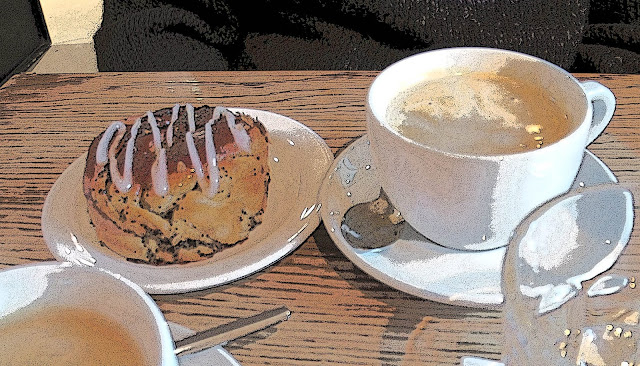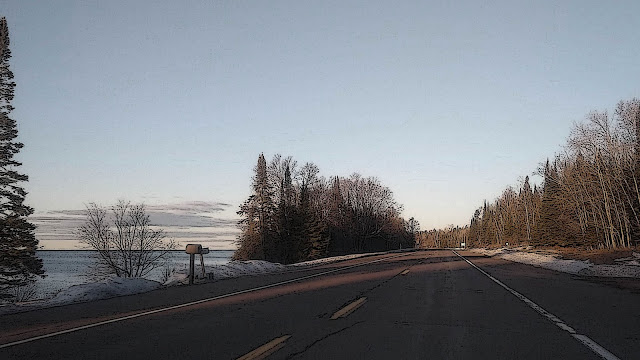This is Chapter 16 of The Inheritance, a serial fiction novel on FITK

Thursday evening, July 16, 2020, Seattle
Out of force of habit Special Agent Marchal parked his car a few blocks away from the Russian-themed
Khorosho Tavern that was located on Northeast Lake City Way. He wasn’t particularly concerned about being seen there, but he knew that routine street surveillance was being conducted in the area and he didn’t want to have to explain why his car’s license plate had turned up in some obtuse crime-watch database. The tavern had weathered the ‘shelter-in-place’ directives of the previous spring by doing take-out and had actually found that, while they couldn’t offer dining, their presence in the community had actually grown from an influx of people looking to break the monotony of their diet. He knew one of the women who ran it and was a regular customer.
“Hi, Nadia,” said Agent Marchal going up to the bar after he entered, “What’s good tonight?”
“Ah! It’s all good,” said Nadia, wiping her hands on a dishcloth, “What brings you here? It’s been a while.”
“Long time, no borscht,” said Marchal, “It’s been a strange couple of months. Is my regular booth open?”
“Da, you be wanting the usual?”
“Borscht, of course, and a word with you when you’ve got a minute.”
His favorite seat was in a booth next to a vintage Russian Tetris arcade game. It gave him a good view of the bar as well as the option of being able to hide in the shadows.
“So. Here’s your borscht, and I’ve got a minute to talk,” said Nadia, handing him his soup and sitting down in the booth across from him, “You want to talk about the riot, no?”
“Mmm… delicious as always,” said Marchal as he sipped the blood-red broth, “About those riots… what have you heard about them, who was behind it?”
“Ah, what would I know, I’m just a waitress in a greazy spoon,” said Nadia with a smile.
“I came here because some of the protestors are regulars at here,” said Marchal, “We’ve got good footage of them of the riot.”
“You never heard what I’m going to say, okay?” said Nadia, nervously, “There is rumor of a… what do you call it… a ‘cell’ in town, just some trouble-makers that want to make the police to look bad.”
“Not witch hunters, then?”
“Probably not but who knows? The guys who were actually in the riot just did it for some pocket money—it has been tough five months for everyone. You aren’t going to bust them over a little parade are you?”
“I don’t care about it one way or the other, but let’s just say that if any of them step out of line again their next demonstration will be in front of a judge.”
“I’ll pass the word,” said Nadia, standing up to leave, “Thanks for letting me know.”
“You aren’t eating your Tater-Tots?“ said Mary to her daughter Mareka who had left the table and was rummaging through the cupboards.
“Where can I find a little plate?” said Mareka, “I want to give Mister Bright Eyes some of my food. You said he liked Tater-Tots.”
“Let’s have a little discussion about that, Kiddo,” said Sean, “Raccoons can be pests
and do a lot of damage.”
“But he’s so cute. He wouldn’t hurt me, would he?” said Mareka.
“Let me ‘talk’ with him first,” said Mary, “I think we can come to an understanding.”
Andrew Stevenson didn’t recognize the sender’s name in his email inbox. It was his private account, not the one for his YouTube sermons, and he wondered where ‘Barbara Merrit’ had gotten the address. He opened it and read:
Dear Reverend, my name is Barbara Merrit, and I am an investigative journalist doing research for a book about Mary Robinson and Sean Carroll, two people that I have evidence of engaging in criminal activities, including conspiracy, fraud and murder. In one of your recent sermons you mentioned Mary Robinson’s internet spell app as “deluding innocents.” I have much more information on Robinson, including photos of her husband consorting with a known killer (attached.) If it is in your interest, I would like to share this information with you and I would be interested in what information you have gathered as well.
Sincerely,
Barbara Merrit
Stevenson smiled. He knew that he didn’t have any real information on the couple, but he thought that Barbara Merrit’s research could be useful to him.
He clicked on ‘reply.’
Agent Marchal finished his meal and left the restaurant, thinking about what Nadia had told him. The existence of a Russian ‘sleeper cell’ in Seattle had been suspected by the FBI for some time, the matter had been referred to Immigration as well as to Homeland Security, which he thought was the equivalent of throwing it in a garbage can. He was about halfway to his car when a large raccoon ran across the sidewalk in front of him, followed by three smaller ones.
“Another group intent on taking over,” he thought, with a smile.
“Sit with me… quietly,” said Mary, on the patio with her daughter, who held a plate of Tater-Tots. Sean was inside, cleaning up; Jo had returned to the guest house, “I am going to use a ‘power’ to try to communicate with the raccoon. Don’t speak, but when I nod you can slowly walk down and leave your plate. Open your hands so he can see that you don’t have a weapon. Don’t touch the animal. Don't smile or let him see your teeth, but
do look him in the eyes, but only for a second. Then walk back here. Do you understand?”
“Yes, mother.”
“Now, we wait.”
Next chapter: Mareka’s Lesson



















